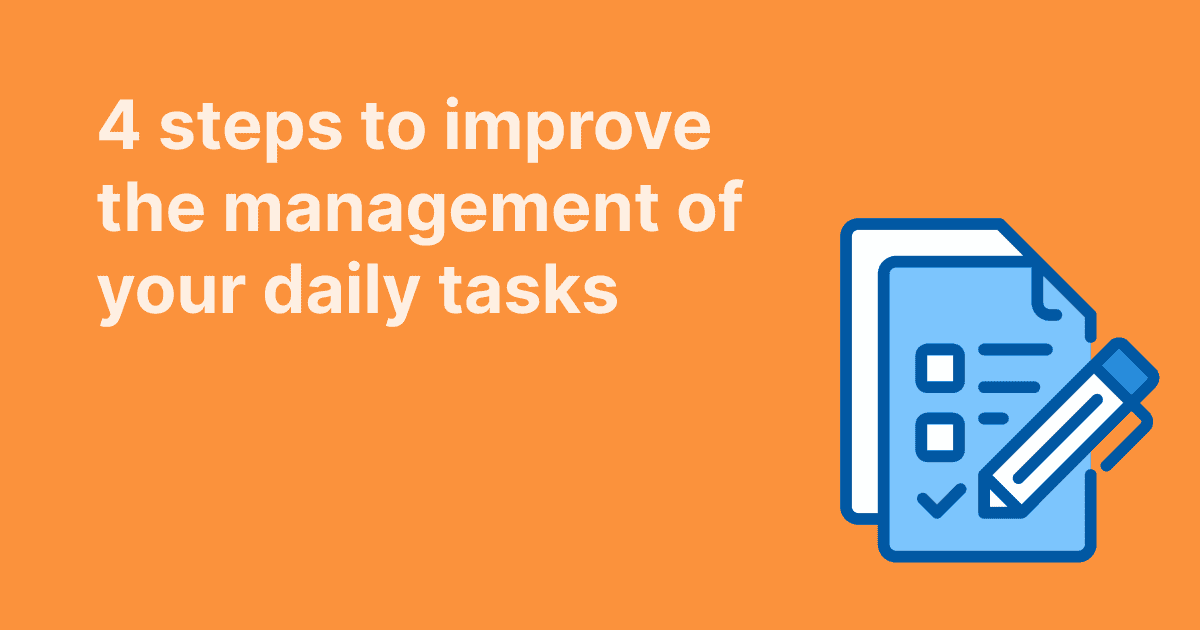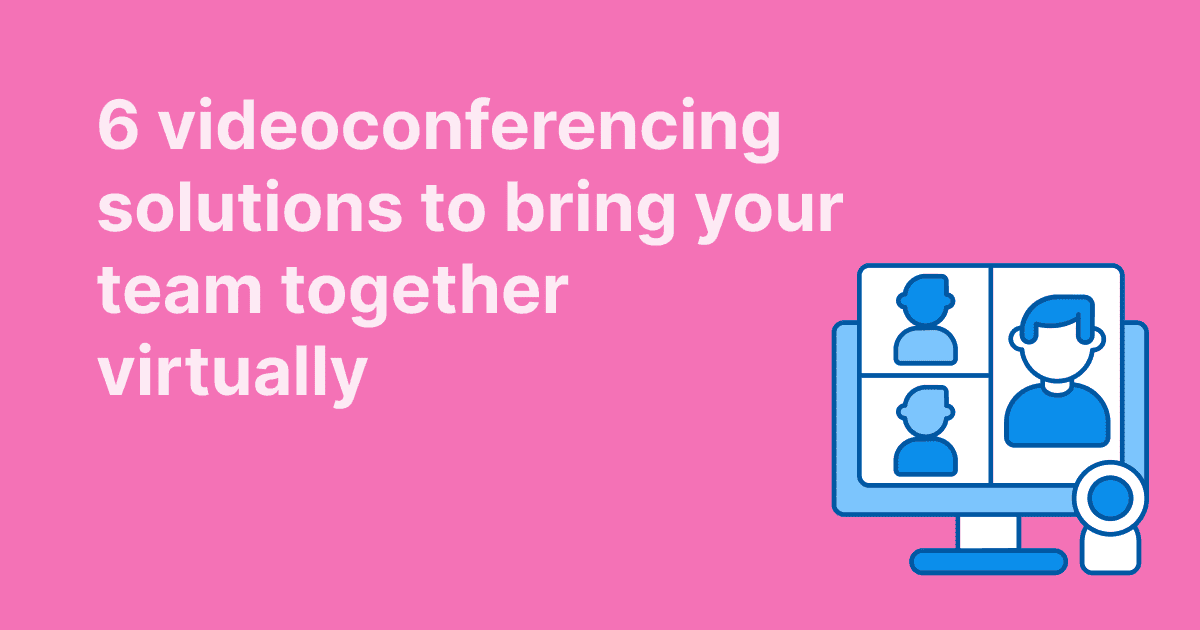A well-organized meeting doesn't just happen. It takes clear planning, defined roles, and active participation to ensure success. Whether you're hosting an in-person or virtual meeting, one of the most effective ways to improve meeting effectiveness is to assign roles ahead of time. By doing so, every meeting participant knows their responsibilities, the meeting stays on track, and decisions are made efficiently.
In this blog post, we’ll explore the 4 key roles that can help you manage the meeting process, from preparation to follow-up, ensuring a smooth and productive outcome.
Assigning roles before the meeting
At the end of a meeting, it’s common for participants to question the meeting’s real purpose or outcome. Poor preparation, lack of structure, poorly defined objectives, and a lack of general commitment are all causes that can compromise the success of your meeting.
Assigning roles in a meeting beforehand ensures each team member is prepared and focused, helping improve meeting effectiveness and establish a strong meeting culture. As is too often imagined, the involvement of participants is not limited to the day of the meeting. To ensure the effectiveness of the meeting, participants have a role to play before, during and after the meeting.
The 4 key roles
1. The organizer: a facilitator
To ensure your meeting's success, you should appoint an organizer who is responsible for the entire meeting process. The meeting organizer sets the agenda, defines objectives, sends out the meeting invitation, and communicates the meeting’s purpose and expectations to all participants.
During the meeting, they act as the meeting leader, facilitating discussions, keeping everyone on track, and making sure objectives are met. Their key qualities? The facilitator is organized, communicates with ease and knows how to set realistic objectives.
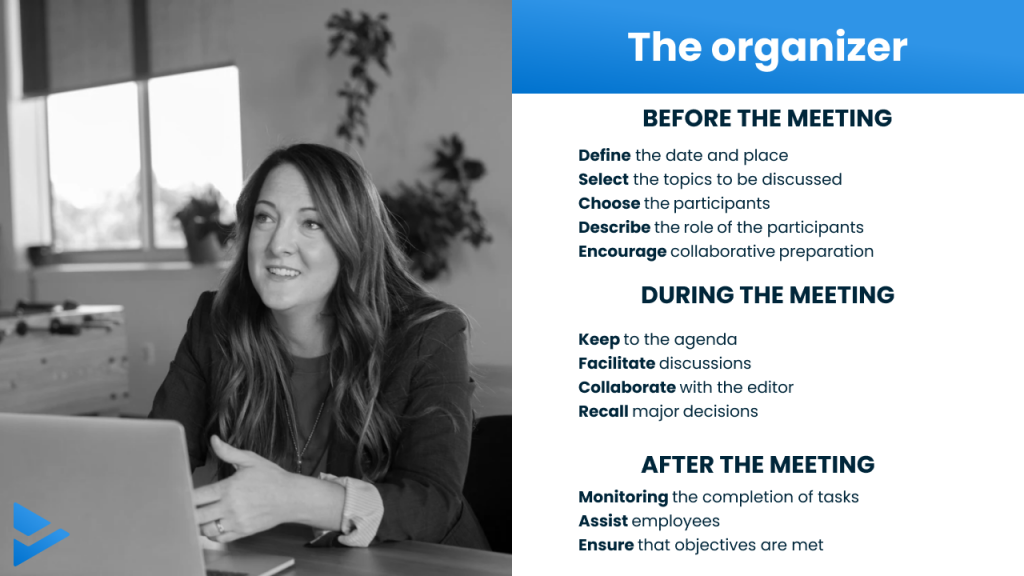
2. The editor: secretary of the meeting
The editor plays one of the main roles by documenting everything that happens during the meeting. They capture the meeting notes, recording key discussions, action items, and decisions. Basically, they feed the content and keep the participants informed. Therefore, it’s important for the editor to be attentive, concise, and systematic, ensuring nothing important is missed.
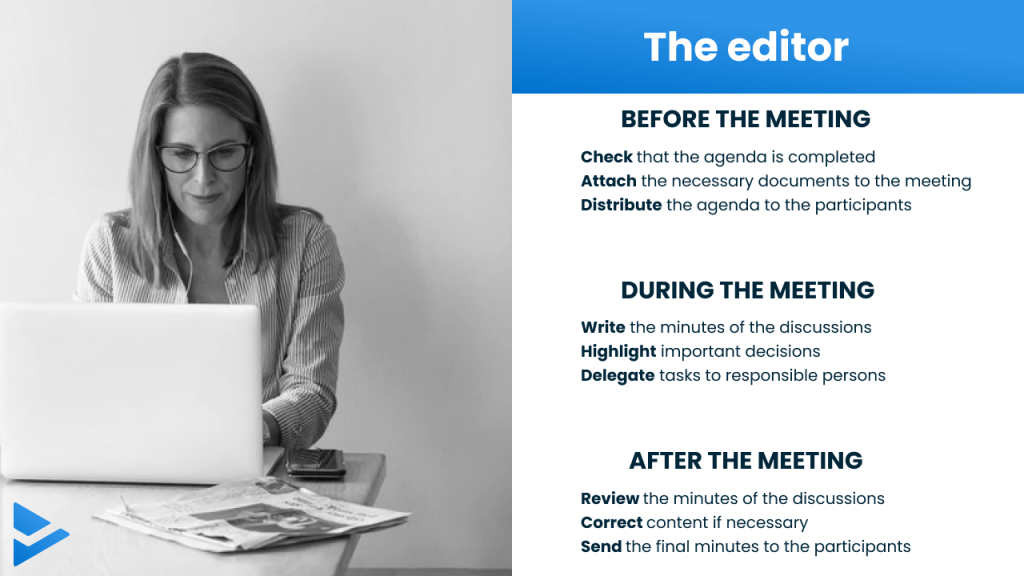
3. The timekeeper
Appointing a timekeeper ensures the meeting stays on track by monitoring the schedule and reminding the organizer if discussions are going over the allotted time. The timekeeper works with the organizer to define the time allocated for all agenda items, ensuring the meeting runs efficiently without exceeding the scheduled meeting time. Therefore, the meeting organizer must define the total time of the meeting beforehand, or better yet, define the time allowed for each point. However, the time keeper will not have any particular role to play after the meeting; they will only be required to read the minutes carefully, just like the other participants.
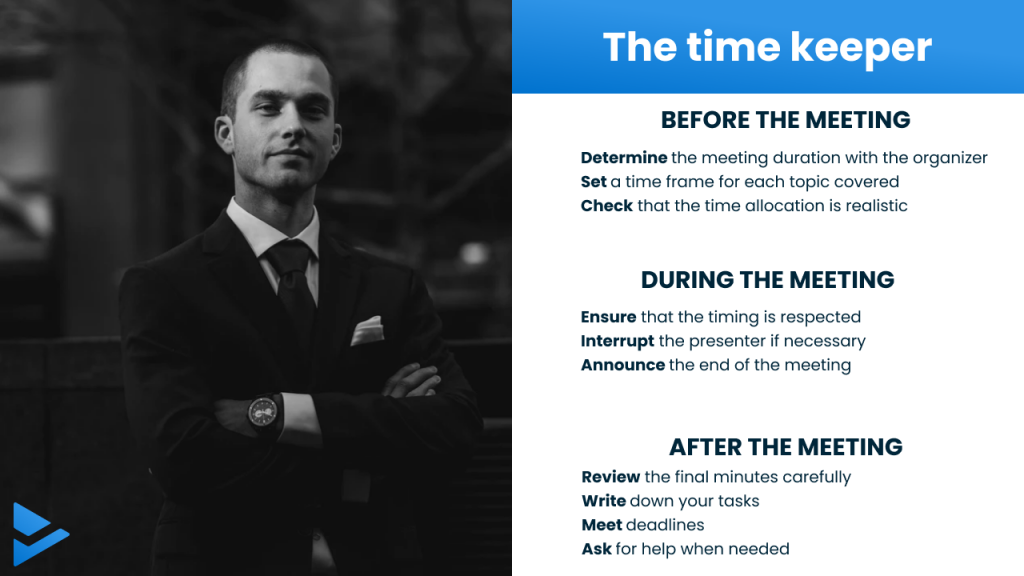
4. The participants, prepared and proactive
All meeting participants must come prepared, stay engaged, and actively contribute. They should be familiar with the meeting agenda and ready to ask questions, provide feedback, and take on assigned tasks. Active participation from all attendees ensures that the meeting runs smoothly and achieves its goals.
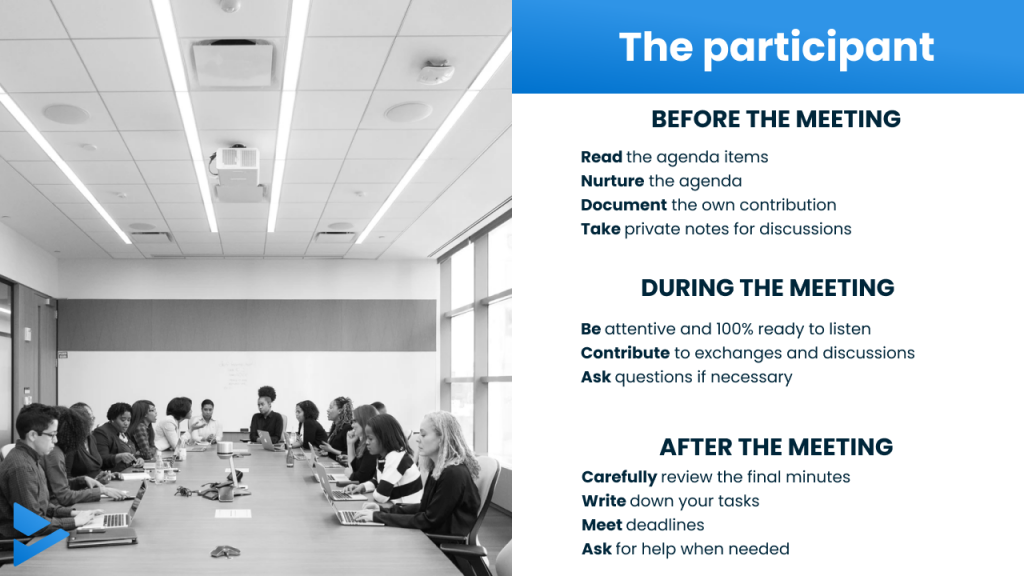
Coordinating roles for effective meeting flow
Each of the four key roles plays a critical part before, during, and after the meeting. Before the meeting, it's essential to prepare and share the agenda items with the team to ensure everyone is aligned and ready. Clear communication from the meeting organizer ensures that participants are well-prepared, improving both the quality and duration of the meeting.
During the meeting, the meeting editor should take notes, record decisions, and track action items in real time, adding them directly to the agenda. This approach saves time and ensures that no important points are overlooked.
After the meeting, participants should have immediate access to the meeting notes to review their assigned tasks. This organized process enables smooth follow-up and helps maintain meeting effectiveness for future sessions.
Before the meeting
The Organizer
The meeting organizer schedules the time, date, and agenda for the meeting. They make sure all team members are informed and prepare accordingly. The organizer also ensures that each agenda item is clearly defined and that only the necessary meeting participants are invited.
The Editor
In collaboration with the organizer, the editor helps prepare the framework, agenda, and any supporting documents that will be needed. By sharing all the necessary documents in advance, the participants are more prepared, leading to a more productive team meeting.
The Timekeeper
The timekeeper works with the organizer to define the time allocated for each agenda point, ensuring the meeting runs efficiently without exceeding the scheduled duration.
The Participants
All team members should familiarize themselves with the meeting agenda ahead of time. This allows them to engage fully in the meeting and reduces the chance of needing clarification afterward. Participants who are presenting or leading a discussion should also prepare their agenda items in advance.
During the meeting
The Organizer
During the meeting, the meeting organizer plays a key role as the meeting leader. Their first priority is to ensure the agenda items are respected and to prevent any distractions that could derail the meeting or prolong it unnecessarily. At the start, the meeting organizer should remind all participants of the meeting's purpose, so everyone feels involved and knows what the goals are.
In most cases, the organizer also assumes the role of facilitator, ensuring the discussions stay focused and productive. It’s important to maintain control of the conversation, making sure debates don’t go off-topic and that every team member has the opportunity to express their opinions on the subject at hand. The goal is to create a positive environment that encourages constructive discussions.
To improve meeting effectiveness, the organizer works closely with the editor throughout the meeting. This collaboration ensures that key points, decisions, and action items are accurately captured and recorded. The organizer ensures the editor has enough time to summarize discussions and properly document the decisions made.
At the end of the meeting, the organizer should remind all participants of the major decisions made and emphasize the next steps. Key follow-up questions should be addressed: Should the date of the next team meeting be set? Is each meeting participant aware of their tasks and responsibilities? The goal is to ensure effective follow-up and maintain accountability from one meeting to the next.
The Editor
During the meeting, the editor is responsible for taking clear and concise meeting notes. They have to capture the essential points without going into unnecessary detail and not to lose the flow of the discussion. While exact formulations can be refined later during the proofreading phase, the priority is to accurately document the decisions and action items agreed upon in real-time.
The editor also plays an important role in assigning tasks that result from these decisions. Once a decision is made, the editor makes sure it’s recorded, along with any action items assigned to specific team members, ensuring there is clarity on responsibilities and deadlines.
The Timekeeper
The timekeeper monitors the meeting schedule, keeping a constant eye on the clock to ensure that the allotted time for each agenda item is respected. If necessary, the timekeeper discreetly informs the organizer that time is running out. The meeting facilitator can then decide whether to shorten the discussion or move toward a decision, keeping the meeting on track.
At the end of the meeting, the timekeeper announces the conclusion of the meeting schedule and ensures that the session wraps up on time, improving the overall meeting experience.
The Participants
Too often, meeting participants are distracted, checking their phones or losing focus. In any team meeting, it’s essential to be fully attentive, especially when important decisions are being made. Participants must be aware of the meeting's objectives and contribute to the discussion to help achieve those goals.
Each meeting participant should engage in the conversation, listen carefully, and offer insights when appropriate. At the end of the meeting, participants should also feel comfortable asking questions to clarify any tasks or responsibilities assigned to them. Being clear on next steps ensures that everyone knows what to do to ensure success between meetings.
After the meeting
The Organizer
After the meeting, the meeting organizer ensures that all assigned action items are completed and that no meeting participants are facing difficulties that could hinder their progress. The meeting leader works closely with the editor to ensure that the meeting notes and minutes are accessible to everyone.
By distributing the minutes promptly, the organizer ensures that all team members can review the content, stay aware of their tasks, and meet upcoming deadlines. This process supports an effective follow-up and contributes to improved meeting effectiveness for future sessions.
The Editor
After the meeting, the editor reviews the live notes to refine, format, and correct them if needed. The goal is to ensure that the discussions and decisions made during the meeting are as clear as possible. Once the minutes are validated, the editor ensures that any supporting documents or files are available to participants. The finalized meeting notes are then distributed to all team members for reference.
The minutes must be detailed and precise, especially for those who were not present at the meeting or for external stakeholders who need to understand the meeting’s outcomes. A clear, well-organized transcript promotes effective communication within the team and makes planning for the next team meeting more efficient.
The Participants
Within 24 hours of receiving the validated minutes, each participant should carefully review the meeting notes. Reading the minutes while the meeting objectives are still fresh in mind makes it easier to recall key discussions and responsibilities. Each participant must then ensure they have noted all the tasks assigned to them and commit to meeting the deadlines, particularly if tasks need to be completed by the next key meeting.
If necessary, participants should not hesitate to seek assistance from their managers to make sure that all objectives are achieved within the agreed timeframe. It’s important to remember that asking for help is a proactive step toward ensuring success and maintaining productivity.
The importance of preparation for a successful meeting
As we've seen throughout this article, clear meeting roles are essential for running an efficient meeting. The preparation phase lays the groundwork for success. By defining objectives, inviting the right team members, assigning roles, and carefully organizing the meeting agenda and timing, you ensure that your meeting is productive.
While we’ve covered 4 key roles, other roles like the decision-maker or mediator can be added based on your organization’s needs. The important thing is that each meeting participant understands their role and how they contribute to the meeting's success. It's a shared effort—organizing a meeting is not solely the meeting organizer's responsibility. By embracing this approach, your company meetings will run more smoothly and effectively.
Using tools like WEDO can help simplify this process. With WEDO, you can collaboratively prepare your meetings, write meeting notes in real time, and track tasks assigned during the meeting.

